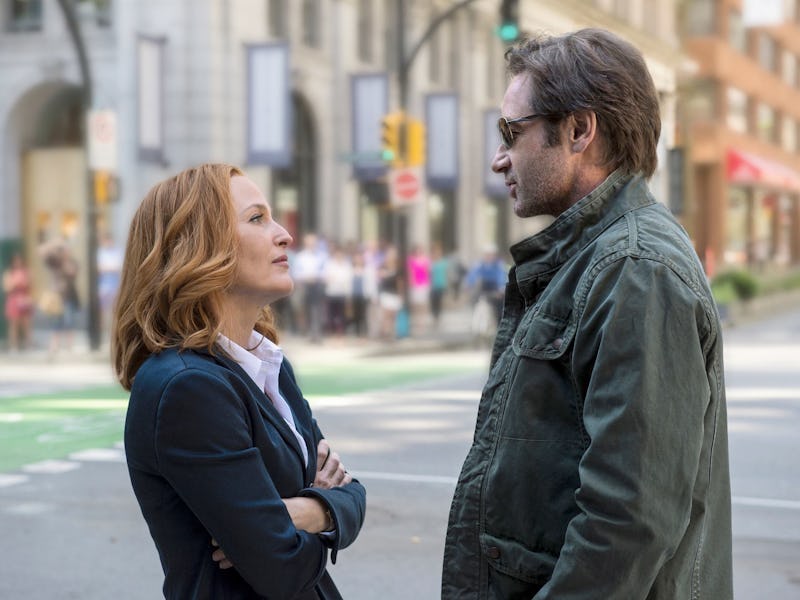Shadow Sci-Fi: 10 Science Fiction Stories About Conspiracies
'The X-Files' has spiritual cousins in 'Fringe,' Joss Whedon, 'Dark City,' and Michael Bay.

The science fiction genre is an expansive universe in its own right. For every sci-fi story about alien planets and foreign worlds, another builds on a framework of secrets and lies. If the triumphant revival of The X-Files is making you hunger for a different type of sci-fi from The Martian, here are 10 stories that spring from Mulder’s iconic premise: The truth (or some delightfully conspiratorial version of it, anyway) is out there.
1. The Adjustment Bureau
This highly underrated film, based on a short story by sci-fi master Philip K. Dick, features Matt Damon and Emily Blunt at their most charming. In it, a shadowy, Kafkaesque bureaucracy with an uncertain agenda makes excellent use of trench coats and bowler hats to steep the story in cloak-and-dagger paranoia.
2. The Thirteenth Floor
When it debuted, this movie fell victim to an unfortunate set of circumstances: It has a similar premise to a certain film that came out around the same time called, uh, The Matrix, which dusted the lower-tech The Thirteenth Floor. But don’t let its obscurity fool you. With alternate realities, speakeasies that may or may not exist, and charmingly ’90s computer sensibilities, it’s a hidden gem.
3. Never Let Me Go
Kazuo Ishiguro’s masterpiece is an exercise in reading between the lines — in the quietly creeping horror of the unsaid. To say it, then, would be to ruin it, if you’re not familiar with it, but this is one example where you should read the book and ignore the movie. The atmosphere of subtle background conspiracy is impossible to capture off the page.
4. Dark City
Amnesia, a neo-noir setting with a color palette cast in darkness, a city with a constantly changing landscape, a background hum of the uncanny, a shadowy group called “The Strangers,” characters with shifting memories beyond their control — this movie has it all.
5. Source Code
This film isn’t exactly original, with clear fragments of sci-fi classics like Memento, Terminator, and even Avatar making themselves known. Nevertheless, it weaves them into a movie that is equal parts thrilling and provocative in its own right, as a man races against time in a Groundhog Day-like repetitive sequence in an alternate reality that may or may not be real.
6. The Heart Goes Last
Margaret Atwood’s gleefully wicked The Heart Goes Last layers conspiracies in increasingly slapdash ways — prison experiment conspiracies, corporate town conspiracies, sex robot conspiracies, spousal manipulation, a dash of murder, and even a memorable Blue Man Group knockoff that isn’t quite what it seems. The story, together with balls-to-the-wall fun, careens wildly until it lurches to a stop at one of Atwood’s signature ambiguous endings.
7. Fringe
The definitive conspiracy show, Fringe has echoes of Lost with a more successful execution and coherent mythology. It echoes Twin Peaks, yet it’s more accessible to viewers who may not be down with Lynchian dreaminess. Picture an X-Files with a more serialized story, for those looking for a show beyond monster-of-the-week. Fringe comes from a long line of conspiracy narratives, yet carves out a place wholly its own.
8. The Island
I know, I know — it’s a Michael Bay film. But he does more than just vapid explosion porn. The Island is surprisingly enjoyable, aided by a strong performance from Ewan McGregor and a simple yet compelling clone-conspiracy framework.
9. 12 Monkeys
While you might know 12 Monkeys from its recent adaptation as a moderately successful SyFy show, the movie remains a classic. Its effects may be dated, but it features the single best performance of Brad Pitt’s career and a series of conspiracies that may or may not be as loony as they seem.
10. Dollhouse
By far Joss Whedon’s most misunderstood show, Dollhouse suffered from an over-ambitious premise and an unsupportive network in its initial run. But it’s catching a second wind on Netflix, as newcomers rethink it and come to appreciate its philosophical premise, exploring the tabula rasa concept and the ways in which humans exert power and ownership over one another. Some even consider it Whedon’s best work, and while we wouldn’t go that far, it’s worth a revisit.